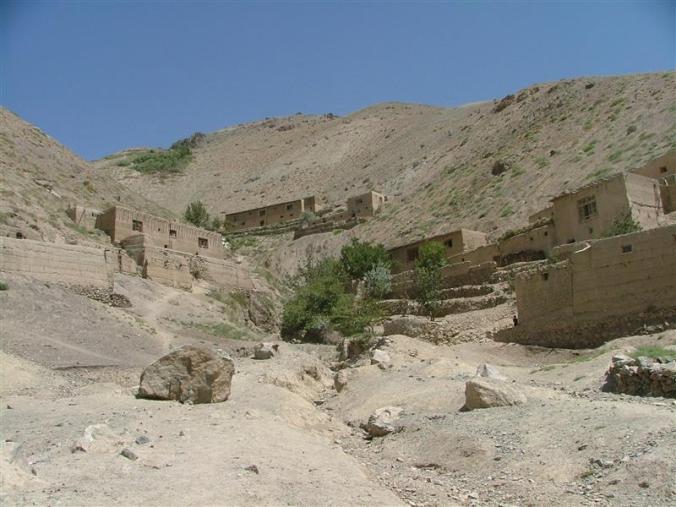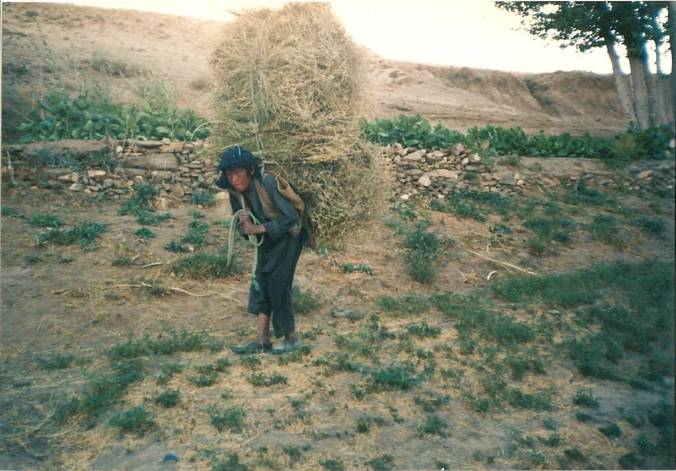Over the next few days there was a flood of visitors – uncles, brothers, cousins, friends – coming to welcome Hussain. And, they all wanted to meet the foreigner making me feel like I was some prize specimen of wild life discovered under a rock.

Not ‘my’ village but typical of villages in Hazara Jat
The most frequent caller was ‘Engineer’, who owned a pharmacy in Sangi Masha. A student of engineering in Kabul he had returned to Jaghoray when the Russian occupation began. His family were wealthy landowners but farming life did not appeal to Engineer. He became a translator for the French medical teams in Qolijou hospital. After a few months, deciding that his medical knowledge was sufficient, he left to set up his own clinic in the bazaar. Later, he opened a pharmacy – an even more profitable concern, since all his patients bought the drugs he prescribed from his shop.
He insisted, despite my protests, on calling me Dr Mary, describing for my benefit many of his more complicated cases. When not discussing his patients’ case histories he asked endless questions about my life in England (explanations that I was from Scotland went unheeded), about my educational qualifications, what I thought of Afghanistan and how did I find the people? I found him exhausting. He would appear at all times of the day and I once found him at six-thirty one morning, drinking tea while Ismail checked his blood pressure. Only his huge ego and irrepressible good humour matched his hypochondria. As he was such a big person in the community the rules of hospitality meant that whenever he appeared we all had to stop whatever we were doing to entertain him. Fortunately, the novelty of my foreign status wore off and he began to call less frequently.

Hard work – collecting fodder
Our landlord, Gul Agha, was an occasional visitor. I was surprised to find that the major landowner in the area was a young man barely into his twenties. When his father had died recently Gul Agha had inherited considerable wealth, but, Ismail confided, not the respect shown his father by the community. This he would have to earn and many of the older generation were sceptical about his ability to assume his father’s position. They considered him too young and impetuous. His father had rejected any political allegiance but Gul Agha was a member of Nasre, and always to the forefront of any skirmish.
Whenever he came to visit, clutching his Kalashnikov and attempting to look as mean and moody as his youth would allow, he would greet me perfunctorily. His conversation – invariably about fighting – was always directed to Hussain, who, goggle eyed with hero worship, hung on his every word. He struck me as a rather humourless young man, overly concerned with his fighting prowess about which he boasted incessantly. I was surprised when he issued an invitation to visit his gardens.
His orchards were a short stroll through the village. When Gul Agha talked about his fruit trees he made a much more favourable impression than when boasting of his escapades as a mujahid. He was clearly knowledgeable and spoke with pride of how his father had introduced new varieties of apples to the area. As he talked he reached out constantly to touch the knurled tree trunks and I felt if he would only throw away his Kalashnikov and concentrate on the land he would be a much happier person.
Sitting beneath an apricot tree, letting the hum of conversation flow over me, I felt pampered as Gul Agha’s brothers, Hazrat and Najib, vied with each other to bring me bowls of the choicest mulberries, almost-ripe apricots and huge bunches of roses. It was, I thought, interesting how Gul Agha seemed to understand I was going to be impressed more by his knowledge and love of fruit trees than his prowess with a Kalashnikov.
A sudden peal of thunder, followed almost immediately by a torrential downpour ended our picnic and we ran for home. And it really did feel like home. The long journey to reach here was – almost – forgotten. The few days of settling in, meeting Hussain’s family and neighbours had been lovely but I knew the holiday was over. It was time to start work and next day we had to travel to the field hospital to collect all the medicines for Hussain’s clinic.

Hussain and Ali Baba enjoying mulberries – my favourite fruit.
I know that feeling when you are the foreigner and everyone wants to meet you. I hope it didn’t turn later. And that reminded me of a play/film with Nicole Kidman, Paul Bettany, and ?? Skarsgard in it. I’ve got the DVD…
I’ve never tasted a mulberry. Must find some sometime.
LikeLiked by 2 people
It’s called ‘Dogville’ (2003), Jemima. Directed by Lars Von Trier.
Lauren Bacall is in it too. 🙂
LikeLiked by 1 person
I knew you would know! Do you recommend it?
LikeLike
Mostly it continued that way though there were a few occasions when I realised I was not welcome. Yes, you must try mulberries – they are delicious, especially when washed in ice cold mountain spring water and eaten in the sunshine.
LikeLiked by 1 person
I was swept away by your description of how the young fighter became a different person one he was in the orchards. Lovely stuff, Mary. 🙂
Best wishes, Pete.
LikeLiked by 1 person
Thanks, Pete. Yes, he was completely transformed into a someone I admired and respected.
LikeLike
Thus is such an amazing story Mary I am really enjoying it 💜
LikeLiked by 1 person
Thanks so much, Willow. I’m delighted you are enjoying it.
LikeLike
It’s so interesting 💜
LikeLiked by 1 person
Thanks for this tour.. So much to take in.
Regards Thom
LikeLiked by 1 person
Thanks, Thom, glad you are enjoying it.
LikeLiked by 1 person
Mary, I can well imagine you felt as if on show a lot of the time. I was taken with your description of Gul Agha … if another time how his, and so many others, lives would have been different. His calm in the orchard and garden is palpable. Loving this series – a real treat for me I’m a fan of good reportage writing!
LikeLiked by 2 people
Thanks so much, Annika. I’m really pleased you are enjoying this series. Gul Agha should have had the chance to work on his land like his father and grandfather did. I just came across some photos and he looks so very, very young.
LikeLike
If people just carried plants instead of guns wouldn’t the world be a great place. Enjoying your stories, Mary.
LikeLiked by 2 people
I like that idea, Lynn 🙂 Glad you are enjoying the stories.
LikeLike
Another interesting post, Mary. It is fascinating to learn about the different personalities and characters.
LikeLiked by 1 person
Thanks, Robbie.Lots more to come 🙂
LikeLiked by 1 person
Pingback: Travels in Afghanistan (6) ~ Mary Smith | Sue Vincent's Daily Echo
I’m curious about the young entrepreneur who labeled himself a doctor and then a pharmacist. Did no one question his credentials? I would guess he hurt a lot of people by giving them the wrong drugs!
LikeLiked by 1 person
No, no one questioned his credentials. Same with the translators at the field hospital – none of them had received any formal training but felt they had learned enough through their work translating for the French doctors to be able to carry on when the medics left. The country had been occupied by the Soviets for ten years, huge areas had been totally devastated, the infrastructure, including access to health sevices, was destroyed so people took what came along. You’ve made me realise I need to explain a wee bit more about that side of things. Also, the pharmaceutical companies have (as far as I can see) no ethics whatsoever and the market place was flooded (still is) with every kind of medication from antibiotics to anti-depressents and everything in between all available to buy over the counter – no prescription even needed. Thanks for your questions.
LikeLiked by 2 people
Crazy and scary, as well!
LikeLiked by 1 person
What an amazing experience. Thanks so much for sharing this with us. I was pleasantly surprised when your cousin stopped in at my book signing and hand-delivered a note from you. How special. Thanks so much.
LikeLiked by 1 person
Thanks, Darlene, glad you enjoyed the post. My cousin was delighted to meet you – and buy a couple of Amanda books. It seems so strange she has met you face to face before I have!
LikeLiked by 1 person
Two degrees of separation. I´m sure we will meet soon. xo
LikeLiked by 1 person
I’m enjoying your story of Afghanistan immensely. What year was this? You might have mentioned, but I’m sorry if I missed it. I’ll be back for the ending soon x
LikeLiked by 1 person
Hi, thanks for dropping by and I’m glad you are enjoying my story. This was in 1989. I went in on July 1st and came back to Pakistan some time in December. I did say int he first post when it was but have realised since that new visitors don’t necessarily start at the beginning so will try to remember to put the year at the start of each post. It hasn’t ended yet, by the way! I’ve been doing a post each Saturday – still plenty more to go.
LikeLiked by 1 person